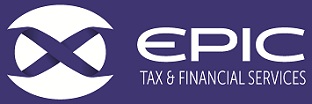Have you bought a pie recently? Would you have bought it if you knew it was void of meat, vegetables or chicken? A pie is good because of what is buried within the pie, and so must be your tax plan. Unless your tax plan adds to current or expected wealth, it is worth nothing. Having helped many clients with varying levels of tax issues and mistakes, Epic Tax and Financial Services have developed the three cardinal principles of a tax plan. Briefly put, your tax plan must be PIE!
The principles are listed below
Principle 1 –The Pre-emptivity Principle (P)
This principle states that a tax strategy must be pre-emptive to succeed. To be pre-emptive, the following rules must be obeyed:
- cash flow must be dealt with at pre tax levels and/or;
- tax deductible expenses envisaged and planned before income is spent.
Principle 2: The Inflow Principle (I)
This principle states that to be valuable, a tax strategy must result in an increase either in actual net income and/or asset or expected income and/or assets.
Principle 3: The Economic Principle (E)
This principle states that to be valuable, a tax strategy must have a very strong probability of producing an immediate and/or expected economic benefit, ordinarily via an increase in net worth.
Case Study
| Name | Peter Smith |
| Income | $160,000 |
| Annual tax bill | $47,147 (medicare excluded in all examples below) |

Current financial picture
Up to 30% of Peter’s current income goes into tax, 31% is spent, leaving 39% to be saved or accumulated, currently into a cash account. If he works for 10 years, he will pay approximately $470,000 in tax. The amount is more if inflation is factored in. Peter’s current strategy violates principle one since he is merely earning the income and putting it into a bank account.
Proposal

Peter’s adviser tells him to borrow $100,000 and put it into a forestry product. Interest and other charges amount to 15%. This product is not expected to pay income for 10 years and lacks independent research. The tax situation is summarised on the left.
Even though the strategy results in tax savings of $36,100 in year 1, net addition to capital is only $10,053 in year one and beyond year one, principle two, the inflow principle is violated. Therefore, unless there is a strong probability that the future returns will be significantly more than the cumulative value of outflows to third parties (principle three), the strategy is not worthwhile.

Often you find that mistakes are likely to occur unless your financial adviser is also a tax specialist. Epic Tax and Financial Services developed the cardinal principles after years of experience dealing with a wide range of clientele. Implicit in these rules is the ability to link the tax plan to an investment or business plan that produces income and adds to immediate and/or future wealth. So it is important that when you are embarking on the road to strategic tax planning, you ensure all your advisers are on the same page with what you are doing. Epic Tax and Financial Services and related entities have Chartered Tax Advisers ™ and Certified Financial Planners ™ that can work together to build a bridge to your long term future.




